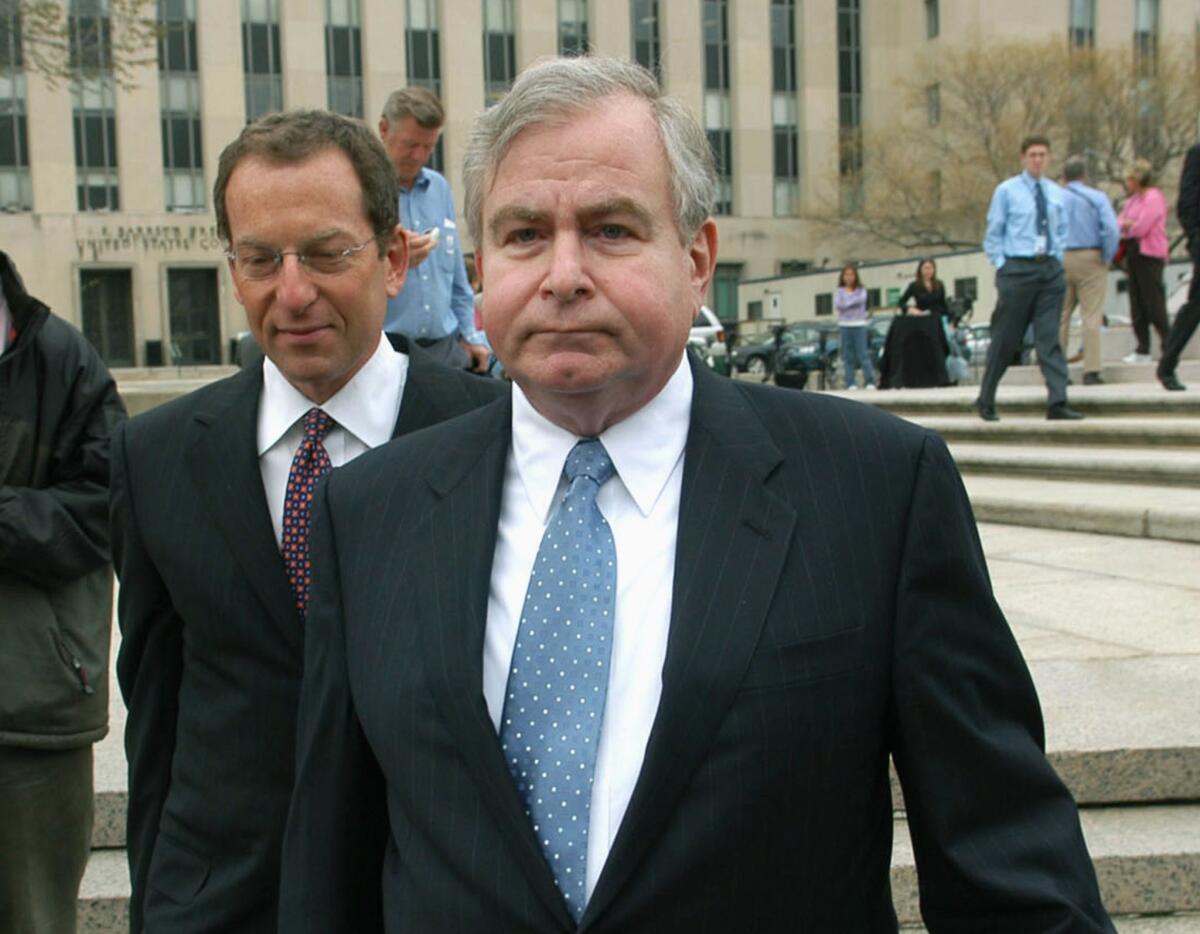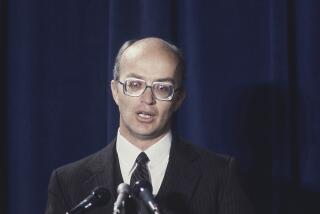Sandy Berger dies at 70; was former Clinton national security advisor

Sandy Berger, who was President Clinton’s top national security aide, died Wednesday, his consulting firm says.
- Share via
reporting from WASHINGTON — Former national security advisor Sandy Berger, who helped craft President Clinton’s foreign policy and got in trouble over destroying classified documents, died Wednesday. He was 70.
The cause of death was cancer, said a statement by his consulting firm, Albright Stonebridge Group.
Berger was White House national security advisor from 1997 to 2001, when the Clinton administration carried out airstrikes in Kosovo and against Saddam Hussein’s forces in Iraq. Berger, a lawyer, also was deeply involved in the administration’s push for free trade, and in the response to Al Qaeda’s bombing of American embassies in East Africa.
He was deputy national security advisor during Clinton’s first term, and had previously worked in the State Department in President Jimmy Carter’s administration.
“Today, his legacy can be seen in a peaceful Balkans, our strong alliance with Japan, our deeper relationships with India and China,” President Barack Obama said in a statement.
Bill Clinton, in a joint statement with his wife, Democratic presidential candidate Hillary Clinton, called Berger a “terrific public servant” who “embraced our common humanity and advanced our national interests.”
In 2005, Berger pleaded guilty to illegally removing classified documents from the National Archives by stuffing some papers in his pants leg. He cut up some of the documents with scissors, for reasons that remain unclear. He was sentenced to probation and a $50,000 fine. He expressed regret for his actions.
Out of government, he helped found an international consulting firm that in 2009 merged with one run by former Secretary of State Madeleine Albright.
“He cared deeply about where this country was going and what we could do to solve problems,” Albright said in a telephone interview. “That was the basis of his life … to make a difference.”
Berger presided over foreign policy during what was a relatively serene period between the fall of the Soviet Union and the September 2001 terrorist attacks.
The biggest trouble spot was the Balkans, where the breakup of the former Yugoslavia spawned a series of civil wars. The U.S. and its NATO allies took military action against what they viewed as Serbian aggression, first in the conflict over Bosnia, then in Kosovo.
Berger led White House meetings during NATO’s 11-week bombing of Kosovo in 1999.
He also played a key role in Operation Desert Fox, the four-day bombing of Iraq in 1998 over Hussein’s failure to comply with U.N. Security Council resolutions about weapons inspections.
Stephen Hadley, who had Berger’s job in the George W. Bush administration, once asked Berger what he remembered about it. “It’s relentlessness,” Berger responded.
Also in 1998, Al Qaeda attacked U.S. embassies in Kenya and Tanzania. The Clinton administration responded with a cruise missile barrage against training camps in Afghanistan and a pharmaceutical plant in Sudan.
The strikes did little to disrupt Al Qaeda and became a thread in a long running criticism that Clinton and his team failed to properly respond to a burgeoning terrorist threat.
But Berger was not blind to the problem. Briefing Hadley and incoming Secretary of State Condoleezza Rice in 2000 during the transition, Berger said they would be “spending a lot of time dealing with Al Qaeda,” Hadley recalled. “That was prophetic.”
After the attacks of Sept. 11, 2001, Berger was vocal in defending the Clinton administration’s counterterrorism record, and it was his passion that may have led to his prosecution.
In court, Berger admitted to taking and destroying three copies of a classified report about the government’s response to the plot in 2000 by Islamic extremists to attack in Los Angeles and other locations. But a report by House Republicans claimed he may have secretly removed many more documents from the Archives.
Albright said she and Berger never spoke about the matter. “Even the finest people make mistakes,” she said.
Berger grew up in Millerton, N.Y., where his father died in 1953 when Berger was 8. His mother ran the family Army-Navy store while raising Berger and his sister.
He went to Cornell, then Harvard law school. He met Bill Clinton while the two worked on George McGovern’s 1972 presidential campaign.
“There is no one I have relied on more these past eight years,” President Clinton wrote to Berger in a letter as the pair left office in January 2001. “You never flinched when American’s interests and values demanded that we make unpopular choices.”
Berger remained an important political and foreign policy figure in Washington.
In August, he wrote an opinion piece for Politico in support of the Iran nuclear agreement.
“It is not without risks, and it does not solve the Iran threat in the region. But it will prevent Iran from developing a nuclear weapon for at least 15 years,” he wrote.
Berger is survived by his wife, Susan, three children and five grandchildren, Albright said.
Dilanian writes for the Associated Press.
ALSO
Jerry Brown sees religion in the science of climate change
California Atty. Gen. Kamala Harris sues to shut down 2 car donation charities
PAC shielded $2.3 million in donations by L.A. charter school backers
More to Read
Get the L.A. Times Politics newsletter
Deeply reported insights into legislation, politics and policy from Sacramento, Washington and beyond. In your inbox three times per week.
You may occasionally receive promotional content from the Los Angeles Times.











